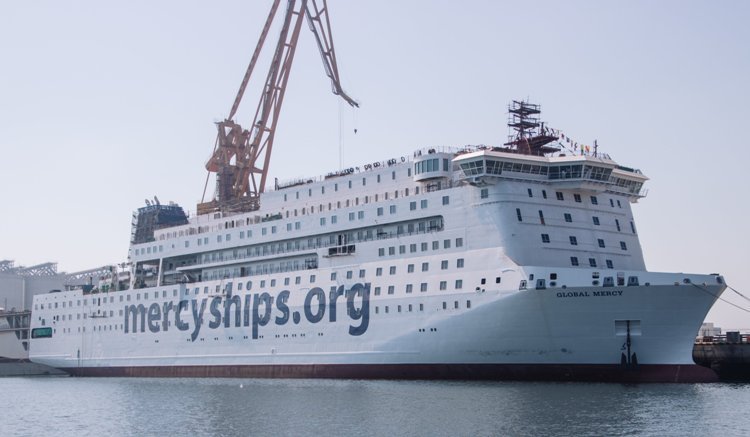Mercy Ships and SPECT Partner to Reduce Surgical Infections at Connaught Hospital in Sierra Leone
SPECT, a nonprofit established in 2013 to address gaps in sterile processing education in resource-limited environments, has been working closely with Connaught Hospital.

A new initiative at Connaught Hospital in Freetown, Sierra Leone, aimed at reducing Surgical Site Infections (SSIs), is being celebrated as a major success. The program, part of Mercy Ships' Safer Surgery initiative, focuses on improving sterilization processes in the hospital’s operating theater, with the support of Mercy Ships' Education, Training, and Advocacy (ETA) department and the Sterile Processing Education Charitable Trust (SPECT).
This collaboration has already delivered tangible improvements in infection control by training 20 nurses in sterile processing techniques over the course of a two-week, hands-on program. The goal is to reduce SSIs, which are a leading cause of post-surgical complications and deaths in low-resource settings.
Training Nurses to Improve Infection Control
SPECT, a nonprofit established in 2013 to address gaps in sterile processing education in resource-limited environments, has been working closely with Connaught Hospital. The initiative directly involved nine nurses from the Operating Theater and nine more from the hospital’s wards, along with staff from the Infection Prevention and Control (IPC) unit. The training covered critical topics like proper cleaning, storage, and sterilization of surgical instruments to ensure the operating room remains free from contaminants.
According to Massiami Soumahoro, Education Training and Advocacy Program Officer, “These participants are learning the standards for sterile processing in surgical environments, how to clean materials, how to store materials, and the best practices to keep a safe operating room so that they can reduce surgical site infections as much as possible.”
The Impact of Surgical Site Infections
Research highlights the significant risks associated with Surgical Site Infections (SSIs), which contribute to 38% of deaths in patients who develop them. Low- and middle-income countries (LMICs), such as Sierra Leone, face far higher SSI rates than wealthier nations, largely due to challenges like limited access to proper sterilization equipment and infrastructure issues that affect postoperative care.
In Sierra Leone, these infection rates have placed a heavy burden on both the healthcare system and the economy. Studies indicate that without targeted interventions, these elevated infection rates could continue to undermine the health system’s capacity to deliver effective care.
Hands-on Learning and Real-World Application
The two-week training involved active participation from the nurses, who engaged in cleaning and sterilizing surgical instruments such as scissors, scalpels, and tweezers. The training emphasized proper procedures, such as soaking tools in a range of disinfectant solutions, scrubbing to remove organic matter, and ensuring that the instruments are free from contaminants after cleaning. Nurses worked in pairs, providing feedback and learning together to improve the sterilization process.
Larry Lawrence, an operating theater nurse, shared his thoughts on the course: “This training has helped me understand how to sterilize the instruments properly, immediately after an operation. We’ll also be able to go back and train other staff on how to do this,” he said. “The rate of infection in the hospital will get better through the intervention of Mercy Ships.”
Kardiatu Kamara, a nurse in the oncology ward, emphasized the importance of sterile processing: “This course is important because if we keep on working without sterile processing, we’ll create many burdens in our health sectors. If we treat patients without using these sterilized processes, or if we use instruments without processing them, we’ll find out that we have so many cases of infection. As a result, it will cause a burden to the government, health workers, and patients.”
A Path Toward Systemic Change
In addition to the hands-on training, the participants are working in small groups to develop Standard Operating Procedures (SOPs) for sterile processing. This is a vital step toward maintaining high standards of sterilization and infection control across the hospital. With guidance from Mercy Ships and SPECT, the hospital will continue to enhance its sterilization processes, ensuring that the knowledge gained during the training translates into long-term improvements in patient care.
Suzanne Thomas, Mercy Ships’ ETA Director, concluded: “There is now a small working group of participants who are developing standard operating procedures for sterile processing. This will help guide those involved in sterile processing to maintain good standards of practice. Mercy Ships and SPECT will continue to follow up to see how the learning is being put into practice through the Safer Surgery program.”
Through this collaborative initiative, Mercy Ships and SPECT are not only addressing immediate infection control challenges but also contributing to building sustainable healthcare capacity in Sierra Leone, with the potential for broader regional impact. The training program is a vital step towards improving surgical safety and reducing healthcare burdens in low-resource settings.
- READ MORE ON:
- Mercy Ships
- SPECT
- Sierra Leone










